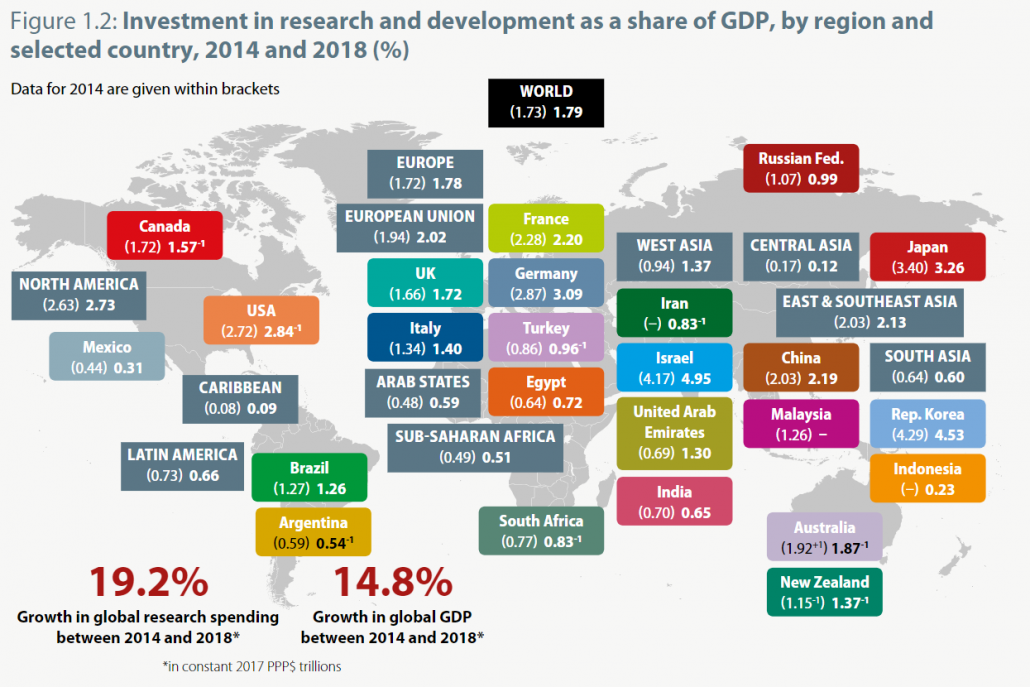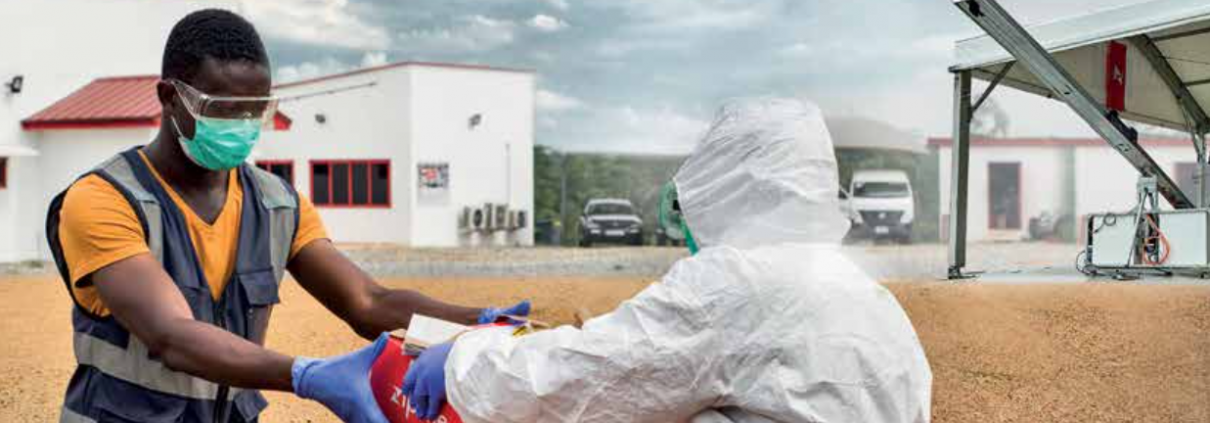The Race against Time for Smarter Development – A European Perspective
What is the current state of global research? How has the scientific community evolved over the past five years? What are the emerging trends in national and regional policy agendas for science, innovation and technology? These and many related issues are addressed every five years in a systematic and data-driven analysis by UNESCO.
The latest 758-page UNESCO Science Report “The race against time for smarter development” provides an inventory of global efforts to move towards a digital and sustainable society. On 9 February 2022, UNESCO and the European Commission hosted an online event that discussed key conclusions of the report and its implications for the European Research and Innovation agenda.
Global Trends
Between 2014 and 2018, global research spending has increased by 19.2% (compared to a 14.8% growth in GDP) and the number of researchers has grown by 13.7%. In spite of these promising figures, however, large inequalities can be found around the globe: four out of five countries are still only investing less than 1% of their GDP on research and the G20 continues to account for more than 90% of the global research spending, publications and patents.

Source: global and regional estimates based on country-level data from the UNESCO Institute for Statistics, August 2020, without extrapolation
A striking trend identified in the report is that countries of all income levels are prioritizing their research efforts to support the transition to digital and green economies. This can be partially explained by the countries’ commitment to reaching the United Nations’ 17 Sustainable Development Goals (SDGs) by 2030. At the same time, there seems to be a strong realisation that rapid transition to a digital society is key to maintaining global economic competitiveness in the future.
“science is at the heart of our future and should form the basis for public policies that support the entire continuum from society to economy”
Importantly, the UNESCO report urges all countries to further increase their spending on science in order to address global issues such as climate change, food security and pandemics more effectively. During the event, Jean-Eric Paquet, Director-General for Research and Innovation of the European Commission, emphasized that “science is at the heart of our future and should form the basis for public policies that support the entire continuum from society to economy.”
The European Perspective
Although the EU remains one of the main players when it comes to producing knowledge, lower and middle-income countries are showing the strongest growth in research investments and output. The playing fields for fundamental research and commercialisation of knowledge are rapidly changing and the pandemic has exposed both strengths and weaknesses of European research and innovation.
Luc Soete, Dean of the Brussels School of Governance at the Free University of Brussels, commented that the global pandemic had a strong influence on how we perform and communicate science in Europe: “The crisis has fostered the green and digital transition across the globe, and promoted further involvement, investment and implementation of science.” On the other hand, Sylvia Schwaag Serger, Professor of Research Policy at Lund University, noted “there is still much uncertainty on how Europe’s massive investments [as part of the European Green Deal and NextGenerationEU stimulus package] will be able to make far-reaching change”, and warned against the effects of a possible economic backlash of the pandemic.
“we need to invest in changing our research culture and start approaching science as a global endeavour, rather than approaching it from the national level”
European and global collaboration will be instrumental in our race against time for a sustainable and digital transition and to fight current and future crises. A truly collaborative international research community can only be accomplished when global equity and solidarity are at the essence of our research policy agendas. As stated by Lidia Borrell-Damián, Secretary General of Science Europe, “[w]e need to invest in changing our research culture and start approaching science as a global endeavour, rather than approaching it from the national level.”
Gender Equality

Source: WEF (2018) The Global Gender Gap Report 2018. World Economic Forum: Geneva.
Strikingly absent from the discussion organised by the European Commission were the report’s alarming conclusions on gender imbalance as one of the major obstacles in realising Europe’s ambitious sustainability and digitalisation goals. Also in Europe, women still accounted for only one in three researchers in 2018, occupied only 24% of the highest positions, and make up a mere 12% of the national science academies’ memberships.
Particularly in areas relevant to the digital revolution (such as digital information technology, computing, artificial intelligence (AI), robotics, physics, mathematics and engineering) women remain underrepresented, meaning that they risk missing out on jobs in a future that becomes increasingly digital. “[…] progress towards righting the gender imbalance could be compromised, unless strenuous efforts are made at the government, academic and corporate levels not only to attract girls and women to these fields but, above all, to retain them”, the report urges.
The Covid-19 pandemic has disproportionally affected women in science and engineering. Women in the USA and Europe have reported a 5% larger decline in research time compared to their male peers (and even 17% for women with at least one child five years old or younger), resulting in the publication of fewer preprints and peer-reviewed articles, starting fewer research projects, etc.
The report concludes that “[s]ome of the radical changes to the work–family balance induced by the pandemic may be here to stay. It will be important for these changes to be converted into policies which ensure that women do not spend a disproportionate amount of time as unpaid carers, homemakers and educators but, rather, have the time and the energy to make their mark on the science and innovation of tomorrow.”
Watch video summary of the report
Useful Links


